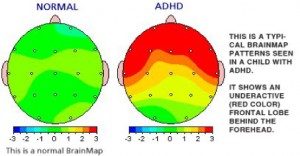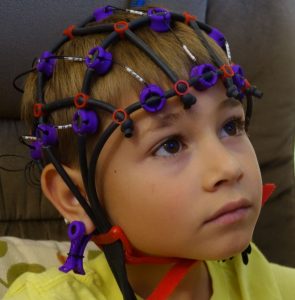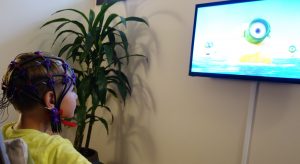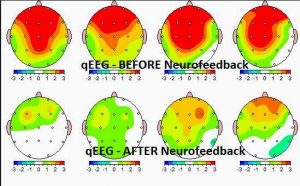What is Neurofeedback?

Board Certified Neurotherapist
Neurofeedback is a process by which the brain is taught to work more efficiently or to overcome a difficulty or limitation. It is unique in that is is direct training of brain patterns, in which the brain learns to function in a more healthy way.
Neurofeedback, also known as EEG Biofeedback, is based on electrical brain activity. Sensors monitor the brainwaves, a process known as the electroencephalogram, or EEG. The EEG readings are then presented back to the participant in the form of sounds and/or images. Thus, the user can observe the brain in action in real time, from moment to moment. Through this process, the brain is rewarded for changing its own activity to more appropriate patterns.
Essentially, neurofeedback is training in self-regulation; it is a broad tool that may be specifically focused to address any particular area of dysregulation. Examples of issues that may be helped with neurofeedback include: anxiety, depression, ADHD, behavior disorders (such as Oppositional Defiant Disorder ODD and Conduct Disorder), sleep disorders, headaches/migraines, PMS, and emotional disturbances such as DMDD. It may also reduce symptoms for organic brain conditions such as Autism Spectrum Disorder, seizures, and cerebral palsy.
Peak Clarity Neurofeedback:
- I offer the most comprehensive set of neurofeedback techniques and equipment in the area.
- I use assessment-guided treatment (EEG Brain Map) instead of a one-size-fits-all approach like NeurOptimal. (For more information on why this is important, see this article.)
- Our Brain Maps measure the full 19 locations of the 10-20 system.
- Our Maps and treatment are administered by a Board Certified Neurotherapist and Licensed Professional Counselor.
- The technology in this field evolves rapidly and I use only the latest hardware and software, such as Brainmaster, Neurofield, and New Mind.
- Our software, maps, and databases are updated monthly. This is a higher cost for us, but ensures that our clients have the latest assessment and treatment protocols.
- Where appropriate, I combine neurofeedback with other technologies such as Heart Rate Variability training (HRV).
- I offer sLORETTA whole brain training. This protocol trains the entire brain at one time, using 19 EEG locations simultaneously.
- The technology in some clinics relies on brain changes that are rewarded when the change is randomly in the desired direction. Because it is random, it is a slower process of learning. I use photic induction and pEMF to move the brain to the desired state. Then I use visual and auditory feedback to train this desired state. This is a much more efficient approach.
- I offer the opportunity to lease equipment and train at home saving you money and time. (Home Training Info)
How Does it Work?
Using a special headband with electrodes (don’t worry, there is no shock or pain!), brainwave activity is measured and processed. Based on years of scientific research, we focus on frequencies we wish to increase or diminish. The system analyzes these frequencies and patterns in real time and instantly presents them back to the user, who attempts to alter the activity level. The information is presented in an interesting and compelling way, such as in a video game. The user learns to play the video game just by using his or her brainwaves. Through this practice, the user learns to consciously control the brainwaves that relate to the aspects of the issue being treated. For example, a person learns to consciously control anxiety level or emotional state. The frequencies targeted and the specific locations on the monitoring electrodes are specific to the conditions being addressed, and also specific to the individual.
Is Neurofeedback a Cure?
Generally speaking, it is a matter of getting the brain to function better rather than curing the condition. When brain function improves, a person is better able to function in the world and cope with stressors. With the organic brain disorders such as ASD and PDD, this is not a cure but an additional tool in treating the symptoms such as emotional dysregulation and attention. With the emotional issues such as anxiety and depression, it may reduce severity, duration, or frequency of occurrence. Again, it is a tool and may not eliminate the issue completely, especially if underlying issues are not addressed (such as trauma, neurotransmitter imbalance, family, or lifestyle issues). With regard to the behavioral disorders including ODD and CD, contributing factors are often poor problem-solving and coping skills. Improving these factors with neurofeedback increases the chances returning to a healthy lifestyle in Fort Collins.
What Conditions Can it Help?
Because it helps the brain function better, it may be beneficial in treating many mental and behavioral conditions. Often, people turn to neurofeedback when other approaches have met with limited success.
Emotional: Bipolar Disorder (BPI & BPII), Depression, Anxiety
 Attention: ADD/ADHD. The American Academy of Pediatrics lists Neurofeedback as a treatment with the “best” empirical support.
Attention: ADD/ADHD. The American Academy of Pediatrics lists Neurofeedback as a treatment with the “best” empirical support.
Organic: Autism Spectrum Disorder (ASD), Traumatic Brain Injury (TBI), Seizure, and Sub-Clinical Seizure Activity, Pervasive Developmental Delay (PDD), Cerebral Palsy, Birth Trauma
Behavioral: Oppositional Defiant Disorder (ODD), Conduct Disorder (CD), Substance Abuse, Impulse Control
Disorders of Childhood: Nightmares, Night Terrors, Bed Wetting, Sleep Walking, Sleep Talking, Teeth Grinding.
Aging: As we age, we lose cognitive function, in part due to diminishing amount of grey matter. This loss is offset by things like rest, good diet, and exercise. Neurofeedback can train the brain to regenerate more effectively (through deeper relaxation) thus offsetting the age-related brain shrinkage. It can also be trained to operate more efficiently. The good news is that almost any brain, regardless of its level of function, can be trained to function better.
Frequently Asked Questions
Who provides neurofeedback?
In our office, it is all administered by Dustin Johnson, LPC, BCN. Neurofeedback (EEG Biofeedback) is typically provided by mental health professionals with advanced degrees, such as counselors and psychologists. Ideally the practitioner has received certification but that is not required. It’s a good idea to check credentials of providers.
I see you also provide counseling. Will I also need that?
That depends on your goals, where you are at, and what you have tried before. I often combine talk therapy with neurofeedback during the same appointment.
Can it help reduce anxiety and stress?
We experience stress when the demands of life exceed our coping resources. Neurofeedback boosts internal coping mechanisms and changes how the brain responds to life’s everyday demands. Anxiety is essentially unaccepted or unacknowledged emotion and biofeedback can help chart a direct path to accepting and moving past it. EEG can also train relaxation techniques which can be used at any time to reduce stress and anxiety.
Is this similar to meditation?
In some ways. Some types of meditation target the same areas targeted in neurofeedback. I strongly believe in the positive effects of meditation and recommend it for anyone. However, neurofeedback is more targeted for a more efficient use of time. The structure of the program helps people be consistent with the treatment, whereas many people struggle to meditate consistently.
How does it help with ADD/ADHD?
This is an evidence-based treatment for ADHD, as are pharmacological and behavioral treatments. We know that medications can help with ADHD, at least in some cases and for a period of time. We also know that behavioral interventions, such as stimulus control can be very effective and should be added to any treatment regimen (contact us for more info). Neurofeedback, however, allows for direct training of attention, control, and focus. A major positive is the lack of negative side effects that are found with stimulant medications.
What if I just want to enhance my performance?
I really appreciate the Health Psychology and Positive Psychology approaches which view all people as on a path to unlock their Human Potential. Everyone has potential to improve their quality of life and reach Peak Performance.
Is the training the same for all disorders and goals?
Not at all. Decades of research have led to optimized neurofeedback programs for specific areas including: seizures, migraines, attention/ADHD, anxiety, stress, depression, and cognitive functioning. Based on the intake assessment and baseline readings, an optimized protocol is set up for the client.
How long do the training effects last?
That depends. The effects will last longer if the type of problem is emotional dysregulation because the training gives the brain a tool to make order out of disorder. The brain will continue to use this tool and in doing so it will be reinforced more and more over time.
There are many situations where the effects of the training may be more likely to fade. For example, when there are continuing insults to the system, such as allergies, chemical sensitivities, and food intolerances. Such symptoms may indicate infection, inflammation, impaired nutrient absorption, or detox pathway issues and are often clustered with Autism Spectrum, ODD, DMDD, and ADHD. Unhealthy physical or psychological environments may also interfere with training retention. Also, degenerative diseases such as Alzheimer’s and dementia may lead to a forgetting of the new training.
In these types of cases, the person may benefit from a maintenance level of training to keep the learning fresh.
What is the success rate?
Given the long history of research on neurofeedback, there is reason to have high expectations for training success. When such success is either limited or temporary, there is usually an underlying cause that requires investigation. Because this is simply a way of training the brain to increase healthy patterns, it is expected to be helpful to most everybody. As long as the program is undertaken sincerely, the gains should be worthwhile. Often, client’s results exceed their expectations.
Will this replace medication?
This is something that only you and your prescribing physician can decide. As the brain learns to self-regulate better with neurofeedback training, you may find that psychotropic medications are needed at a smaller dose or not at all. I do not recommend adjusting any medication without the consent of your doctor.
How often do I train?
Training effects are cumulative. The more sessions you have, the faster you will progress. People typically train as their finances and schedules allow, usually 2 or 3 days per week. I have convenient after school openings. Note that Brain Maps are ideally done in the morning when the brain is fresh. With home training, people can train every day, or even multiple times per day.
How long before I notice a difference?
The standard protocol is 20-30 sessions. To solidify gains, it is best to do another 10 sessions over the course of the next year. Some people come in once weekly as resources allow. For some people, the effects are cumulative; for others, no effects are noticed until a certain number of sessions are completed. Some patients with ADHD see little progress for the first 25 sessions, then make great gains. The reason for this is unclear. The effects are cumulative and it is strongly advised that all sessions be completed in a timely matter for best results. Many people start to notice the effects after a few sessions. Remember that it has taken years to build a dysfunctional neural network and it will take some time to improve it.
More Information
Dustin Johnson, LPC, BCN
Basic Intro Video
Neurofeedback and ADHD
Ted talk on NF with Autism and Developmental Disorders
NF for Epilepsy
How Much Does This Cost?
See our Fees page or contact us for pricing. We provide neurofeedback in our Fort Collins office.




